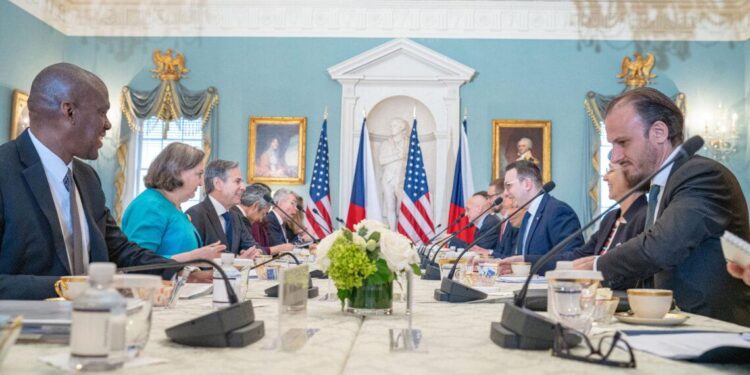The United States has announced the suspension of its strategic dialogue with Kosovo, citing concerns over recent actions taken by the country’s caretaker government. The move, reported by Anadolu AjansńĪ, marks a significant setback in bilateral relations, reflecting Washington’s disapproval of Pristina’s latest political decisions. This development raises questions about the future cooperation between the two nations amid ongoing efforts to stabilize the Western Balkans region.
US Suspends Strategic Dialogue with Kosovo Citing Concerns Over Caretaker Government Actions
The United States has officially put the strategic dialogue with Kosovo on hold, citing significant concerns stemming from the actions taken by Kosovo’s caretaker government. Washington expressed apprehension regarding recent decisions perceived as undermining democratic processes and regional stability. This suspension marks a critical moment, reflecting the U.S.’s growing unease with the interim administration’s approach amid ongoing political uncertainties.
According to sources, the U.S. administration highlighted several key issues in its decision, emphasizing the need for transparent governance and adherence to democratic norms before resuming high-level talks. The concerns focus on:
- Lack of legitimacy: The caretaker government’s temporary status has raised questions about its authority to make long-term policy decisions.
- Controversial policy moves: Actions taken without parliamentary backing have heightened tensions both domestically and with neighboring countries.
- Regional security risks: Instability in Kosovo could affect broader Balkan peace efforts supported by the U.S. and international partners.
| Issue | Implication |
|---|---|
| Caretaker government legitimacy | Hinders diplomatic negotiations |
| Unilateral policy enactments | Increases regional instability |
| Delayed parliamentary elections | Prolongs political uncertainty |
Implications for Kosovo’s Political Stability and Bilateral Relations with the United States
The suspension of the strategic dialogue signals a critical juncture for Kosovo’s political landscape, casting a shadow over the caretaker government’s legitimacy and governance capacity. The move has intensified internal power struggles, deepening divisions between political factions and raising questions about the caretaker administration’s ability to navigate both domestic and international pressures. Observers warn that prolonged political uncertainty may stall key reforms and hamper efforts toward Euro-Atlantic integration, potentially undermining years of progress made in state-building and democratic consolidation.
Consequences on bilateral relations with the United States are expected to be far-reaching, affecting cooperation across multiple sectors:
- Diplomatic engagement may slow, with fewer high-level meetings and reduced U.S. support for Kosovo’s international ambitions.
- Security cooperation, including joint training and intelligence-sharing initiatives, could experience operational setbacks.
- Economic aid and development projects risk delays or reassessment amid increased skepticism toward the current administration’s policy direction.
| Area of Impact | Potential Effect |
|---|---|
| Political Stability | Increased factionalism, governance paralysis |
| Security Cooperation | Reduced joint operations and training |
| Economic Assistance | Possible suspension or delay of aid programs |
Recommendations for Restoring Dialogue and Fostering Democratic Governance in Kosovo
To rebuild trust and reinvigorate democratic processes in Kosovo, it is essential for all stakeholders to engage in open and constructive dialogue. Emphasis should be placed on inclusive political conversations that bridge divides between the caretaker government, opposition parties, and civil society. External partners, including the United States and European institutions, must encourage transparency and accountability, ensuring that Kosovo’s governance structures adhere to democratic norms and avoid unilateral decisions that heighten tensions.
Effective measures moving forward could include:
- Establishing independent oversight bodies to monitor governmental actions and protect rule of law
- Launching confidence-building initiatives aimed at fostering cooperation between ethnic communities
- Facilitating regular, mediated dialogue sessions with clear agendas and timelines
- Promoting electoral integrity through impartial election monitoring and civic education
| Priority Area | Recommended Action | Expected Outcome |
|---|---|---|
| Governance Reform | Create watchdog committees | Improved accountability |
| Interethnic Relations | Organize joint community forums | Reduced tensions |
| Electoral Process | Increase transparency measures | Greater public trust |
| International Cooperation | Resume strategic dialogues | Strengthened partnerships |
Key Takeaways
The suspension of the strategic dialogue between the United States and Kosovo marks a significant pause in bilateral relations amid ongoing political instability. As the caretaker government faces international scrutiny, the move underscores Washington’s concerns over governance and adherence to agreed-upon commitments. Observers now await developments in Kosovo’s political landscape, which will likely influence the resumption of constructive engagement between the two partners.
















